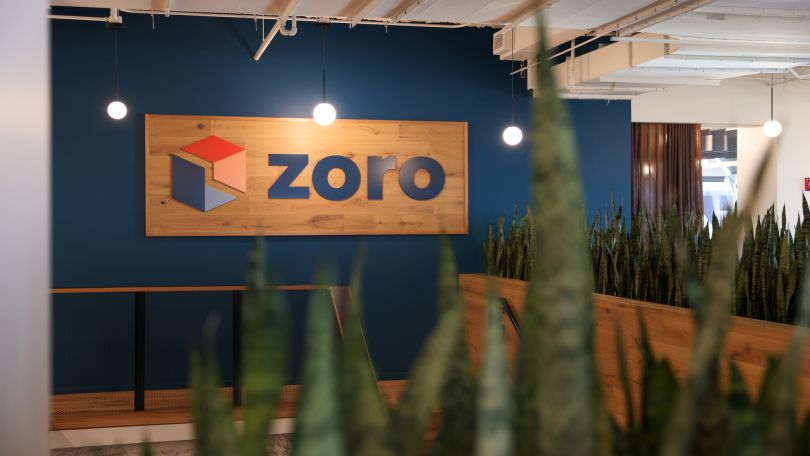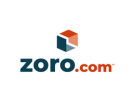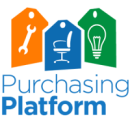Workplace flexibility is more than a nice perk. For many, workplace flexibility is the difference between getting to build the life they want and potentially missing out on moments that matter.
Like when Jay Shell-Larson, director of data science and product analytics at Zoro, got some big news.
“Last year, I got an unexpected — but life-changing — phone call,” Shell-Larson said. “My husband and I had been selected as adoptive parents and needed to travel right away to meet the baby.”
When Shell-Larson told his manager, he was met with nothing but support.
“I messaged my manager with the news and his immediate response was genuine excitement — he reassured me that everything at work would be taken care of,” Shell-Larson added.
And it was. Zoro’s parental leave policy kicked in right away, allowing Shell-Larson to solely focus on his growing family. It’s well-documented that this sort of workplace flexibility correlates with job satisfaction. Just ask OppFi’s Kate Kloor, a senior software engineer II.
“My team focuses on outcomes rather than strict hours, which is one of the most important drivers in building a culture of mutual trust and respect,” Kloor said. “When your employer trusts you to get your work done in the way that works best for you, it inspires you to do your best.”
In addition to Shell-Larson and Kloor, Built In spoke with four other professionals whose flexible work environments have positively impacted their lives.
Zoro, an e-commerce company, sells products that help keep businesses running.
What does flexibility in the workplace look like for you?
Flexibility at work starts with recognizing that employees are people first — with unique needs, responsibilities and preferences. At Zoro, this people-first mindset is deeply ingrained in both how we lead and the policies we uphold.
When I onboard a new team member, I make it a priority to understand how they work best — whether that means scheduling around childcare pickups, setting aside quiet focus time, or adjusting to communication preferences. These conversations build trust and lay the foundation for a supportive, flexible working relationship.
Zoro’s hybrid work policy empowers teams to decide when in-person collaboration makes sense while still honoring personal obligations like family needs or appointments. Leaders actively encourage the use of paid time off and model this by taking time off themselves, reinforcing that rest and balance are valued.
Sometimes life throws curveballs — a sick kid, a family emergency, a last-minute appointment. In those moments, the priority is just making sure people feel supported. Managers step in, teammates help each other out and we figure it out together.

Why is flexibility an important element of your company’s culture?
Last year, I got an unexpected — but life-changing — phone call. My husband and I had been selected as adoptive parents and needed to travel right away to meet the baby. I messaged my manager with the news and his immediate response was genuine excitement — he reassured me that everything at work would be taken care of.
As I left to start my paternity leave, I didn’t feel stressed about what I was leaving behind. There was time later to sort out the details, but in that moment, I knew my team and my leader had my back. Zoro’s adoption assistance program and parental leave policy gave me the support I needed on paper — but it was the people and the culture that made it possible to be fully present for one of the most important moments of my life.
What tools or meeting structures ensure that a flexible work setup works for everyone?
Zoro’s office is designed for hybrid collaboration, with every meeting room equipped for seamless video conferencing so remote and in-person team members can fully participate. When people are onsite, there are plenty of ways to connect casually — over coffee, ping-pong, or even Mario Kart.
That same spirit of inclusion shows up in our bi-weekly company meeting. It’s a chance to hear about great work across the org and anyone can volunteer to host by sharing a bit about their life. In-office employees gather over breakfast to watch on a large screen while remote attendees join virtually. Questions come from Slack and the room and emoji reactions light up the screen as people celebrate wins or laugh together.
It’s a great example of how thoughtful tools and intentional design bring people together — no matter where they’re working from.
Wipfli is an advisory firm that delivers holistic solutions to help clients navigate the modern marketplace, optimize performance and drive growth.
What does flexibility in the workplace look like for you?
As a member of the business development team at Wipfli, I report to the local office here in Chicago, however, I am listed as a remote employee. This provides the flexibility to collaborate while in the office, as well as travel to conferences or client and prospect meetings when needed. When internal calls are scheduled, employees always have the option to attend live or via teams. The organization has also implemented a “meeting-free Wednesdays” policy, where employees are encouraged to avoid scheduling to enhance productivity.
Why is flexibility an important element of your company’s culture?
Wipfli truly cares about the well-being of their employees and one way that is demonstrated is through allowing for a flexible work schedule. Oftentimes personal obligations come up, whether that be attending a doctor’s appointment or even needing to be home to tend to a pet. Leadership is very adamant in understanding everyday needs and trusting employees to start their day earlier or end later, as long as the work gets done.
What tools or meeting structures ensure that a flexible work setup works for everyone?
Outside of “meeting-free Wednesdays” and having the opportunity to attend calls in person or virtually, Wipfli encourages employees to work in the office but does not institute a firm policy around assigned days. This allows employees to work from home or in the office at their discretion. That said, lunch is typically catered in the office on Tuesdays, so that is always a good opportunity to socialize with coworkers. One additional aspect I really value is an internal mailing list that keeps employees informed about casual happy hours and other fun gatherings!
NinjaHoldings empowers people overlooked by traditional financial institutions to take control of their finances via a full suite of digital banking and lending products.
What does flexibility in the workplace look like for you?
Flexibility here means trust and clarity. We keep meetings short and comms mostly async — fast when needed, but never performative. Managers focus on outcomes, not vanity metrics and everyone knows their role in the bigger picture. Workloads are shared and we pull together toward common goals, which gives people the freedom to manage their time and do their best work without micromanagement.
Why is flexibility an important element of your company’s culture?
Flexibility reflects our belief that great work happens when people have full lives and real autonomy. We hire smart, capable people and trust them to own their time and decisions. That means we can tap into a wider, more diverse pool of talent — and learn more from each other in the process. One of the most energizing parts of my week is seeing someone make a call, try something new and come back with insight that makes us all better.
What tools or meeting structures ensure that a flexible work setup works for everyone?
Tools only work if you actually use them — and we do. Slack keeps async communication flowing, but we lean just as much on project management and documentation tools to make work visible across time zones and roles. Clear goals, well-documented processes and transparent tracking mean fewer status meetings and more time for focused work.
OppFi expands credit access to the 60 million everyday Americans who lack traditional options.
What does flexibility in the workplace look like for you?
To me, flexibility in the workplace means managing my responsibilities at home without sacrificing my work performance or well-being. I’m part of the “sandwich generation,” which refers to those who simultaneously care for their aging parents and their children. I care for both my mother and my toddler. Providing care comes with a lot of juggling, including doctor appointments, daycare drop-offs and everything in between.
At OppFi, my managers and teammates are incredibly supportive and open to communication. We collaborate on scheduling and adjust as needed so everyone stays productive and feels supported. My team focuses on outcomes rather than strict hours, which is one of the most important drivers in building a culture of mutual trust and respect. When your employer trusts you to get your work done in the way that works best for you, it inspires you to do your best.
OppFi is a remote-flexible workplace, meaning employees can work remotely or at the office depending on their roles. We have a “Thrive Where You Work, Work Where You Thrive” philosophy that encourages career success while balancing work and life. That kind of flexibility makes a big difference.
Why is flexibility an important element of your company’s culture?
Flexibility is a huge part of why I joined OppFi. When my previous employer implemented a return-to-office policy, I immediately started looking for companies that not only offered remote work but fully embraced it as part of their culture, not just as a temporary benefit.
When I joined OppFi, the difference was immediate. Almost everyone on my new team scheduled a one-on-one to introduce themselves and welcome me to the company. I also had a new experience, trying pair programming for the first time. Pair programming involves two engineers working together on the same problem virtually using Zoom, taking turns as “driver” and “navigator.” The driver shares their screen and the navigator helps guide the process. It was a great way to collaborate, build rapport and learn the ropes. My team even focuses our team-building activities around virtual experiences, like playing online board games together.
The culture at OppFi feels positive, intentional and genuinely inclusive, which is especially important in a remote environment. It proves that flexibility is not just a policy at OppFi — it is something we actively live and reinforce.
What tools or meeting structures ensure that a flexible work setup works for everyone?
Slack and Zoom are at the core of how our team stays connected, especially with the integration between the two applications, making it easy to jump into quick, impromptu meetings. These short conversations are great for collaborating or answering questions in real time, which helps us stay productive and supported in a remote environment. During our daily standup meetings on Zoom, we review priorities and share what we’re working on. On Fridays, our scrum master adds a fun question to close the week, such as “if money and skill weren’t an issue, what non-tech job would you want?” You’d never guess who wanted to be a sci-fi author or a personal chef! Occasionally, on Fridays, we also play online team games. Two group favorites include Codenames and Gartic Phone, a hilarious drawing version of Telephone.
These moments of connection help us learn about each other personally outside of work, which requires more intentionality to achieve in a remote environment. They let us laugh, build trust and see how each person approaches problems differently.
HERE Technologies is a location data and technology company that created the first digital map over 35 years ago. Today, HERE works with the automotive industry, transport and logistics, mobility, manufacturing, retail and the public sector.
What does flexibility in the workplace look like for you?
COVID changed perceptions of workplace flexibility, but not entirely. Remote work existed pre-COVID, especially in the tech industry, attracting candidates with its flexibility and lack of commute. It appealed to me too — working from a comfortable environment sounded ideal. However, during lockdown, I discovered I needed in-person interactions to thrive at work. Connecting, bouncing ideas, gaining perspectives, and solving problems efficiently all felt more natural face-to-face. Online meetings just couldn’t replace the spontaneity and dynamics of office discussions.
Though I still value the convenience of working from home, I now prefer the office. I’ve adjusted my company’s two days in office and three days at home schedule to spend four days in the office, using Fridays for winding down and catching up on admin tasks. Office time allows me to engage directly with colleagues, including those from other departments, fostering collaboration and connection beyond the digital realm.
Additionally, our company’s remote work policy — allowing temporary work from other countries — offers flexibility to adapt to life's challenges and support loved ones or simply change the scenery for a while.
Why is flexibility an important element of your company’s culture?
Like many tech companies, HERE operates in a constantly evolving landscape. The rapid advancement of AI and the challenges of mapping a changing world demand that our teams balance time for connection with time for focused work. For many engineers, focus time is vital and directly enhances their productivity. This balance also requires self-discipline, clear communication, and a strong task-tracking system to maintain visibility of deliverables and manage expectations effectively.
A blend of office and remote work is essential to fostering a healthy environment where teams can connect, create and deliver. In my own projects, this flexibility has been highly beneficial. I schedule solutioning workshops for office days to leverage the dynamics of face-to-face interactions, while allowing the team to set their own home days. This approach not only supports individual productivity but also ensures that communication remains seamless and outputs are delivered efficiently.
What tools or meeting structures ensure that a flexible work setup works for everyone?
Like many companies, we rely on standardized communication, collaboration and project tracking tools to maintain a consistent platform, which isn’t a bad thing. That said, we strive to make the experience enjoyable. Our discussions are typically informal, with numerous chat groups — some of which aren't work-related. My personal favorite is the rugby chat, where we follow matches and exchange playful banter among international team supporters. We even have "secret" chat rooms solely for venting about the quirks of certain software tools.
Successfully managing a globally distributed workforce, however, requires more than just tools and processes. Trust, enjoyment, and understanding are critical components. Teams must negotiate time zones and find optimal setups for strong connections and collaboration. While this process often involves some trial and error, an open mindset about what works and what doesn’t, enables teams to quickly find their rhythm and achieve outstanding results.
Purchasing Platform is an online marketplace for the property management industry.
What does flexibility in the workplace look like for you?
For me, flexibility means having the support to work in a way that aligns with my goals, schedule and personal preferences. I had only been with Purchasing Platform for a few months when I first brought up the idea of working remotely from Japan for six months on a Nomad Visa. I really wasn’t sure what the response would be, but from the start the team dynamics made me feel comfortable asking so I gave it a shot. Working with my manager and HR, we aligned on a few core overlap hours to make sure I could collaborate with the team and I’ve had the freedom to manage the rest of my schedule based on what works across time zones. It’s not a free-for-all — there’s structure — but it’s built on mutual trust. Again, the fact that I felt comfortable even bringing up the idea and that we made it work, says a lot about the culture here.
Why is flexibility an important element of your company’s culture?
Since I started learning Japanese five years ago I knew I wanted to go to Japan — and not just for visiting, but to truly immerse myself in the culture and daily life. Thanks to Purchasing Platform’s flexible approach to work, I have been able to make that dream a reality without hitting pause on my career. Being supported in such a meaningful life experience has been incredibly fulfilling and it’s made me even more invested in the work I do. When a company trusts you to live your life fully while contributing to big goals, it really creates a level of loyalty and motivation that can’t be forced.
What tools or meeting structures ensure that a flexible work setup works for everyone?
We have a few meetings throughout the week that the team has scheduled earlier in the day that really help keep us aligned. These are our daily tech standup and a weekly cross-functional sync. Both are short, focused meetings — 15 minutes or less — but they go a long way in keeping communication smooth and making sure nothing slips through the cracks. All of the team members are also very open to quick sync ups as needed which really fits with my communication style as well.
















